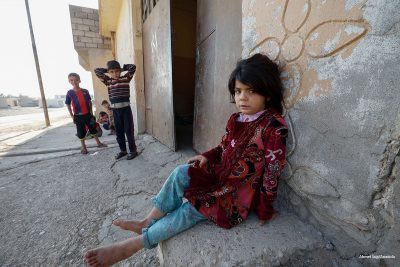UN Report: 45,000 Children Displaced in Iraq Without Identity Documents

A UN report stated that 45,000 displaced children in Iraq lack personal identification documents and that many of them do not receive education two years after the defeat of ISIS-Daesh.
The report issued by the United Nations Assistance Mission for Iraq (UNAMI) and the Office of the High Commissioner for Human Rights (OHCHR) indicated that about 45,000 displaced children are living in the camps, who lack personal identification documents, reported the Anadolu Agency.
The report said that one of five families who live outside the camps had children with documentation problems (lack of identification documents).
The report added that most of the families that lived under Daesh control lacked at least one of their essential identification documents, i.e., either lost, confiscated, destroyed, or not issued in the first place.
The report conveyed that losing identity documents has severe implications for access to social services, in addition to being a major obstacle to enroll children in school.
Daesh invaded northern and western Iraq in the summer of 2014 and controlled a third of the country’s territory, before losing all of those areas during the war that ended in late 2017.
This has caused the displacement of nearly 6 million Iraqis from their houses, most of whom have returned to their hometowns or cities, while about 250,000 people are still living in camps scattered throughout the country.
The report, entitled: The Right to Education in Iraq, stated that many of those who responded to the survey have indicated that they cannot move freely in and out of the displacement camps, due to the restrictions imposed on their movement, which prevents them from carrying out daily activities such as going to schools outside the camps.
The report pointed to two main factors that challenge children’s access to proper education, the first of which is “the lack of appropriate programs aimed at reintegrating the students, whose studies were interrupted for too long, into the government education system.”
The second factor is the difficulty in obtaining identification documents, which constitutes a major challenge for parents while trying to enroll their children in school.
The report stressed that the problem is continuously aggravated, as many adolescents have reached an age where they can no longer stay in primary schools, in addition to the lack of adequate schools and rapid-learning programs.
The UN report called on the Iraqi government to minimize administrative and security challenges, accelerate children’s access to civil documents, and review the provisions on the forms of education available to them, which compensates for the loss of years of education due to the control of Daesh over the children’s hometowns.
*
Note to readers: please click the share buttons above or below. Forward this article to your email lists. Crosspost on your blog site, internet forums. etc.
Featured image: Iraqi children are seen in a town of Mosul after the village was retaken by Peshmerga forces from Daesh on 31 October, 2016 [Ahmet Izgi/Anadolu]

